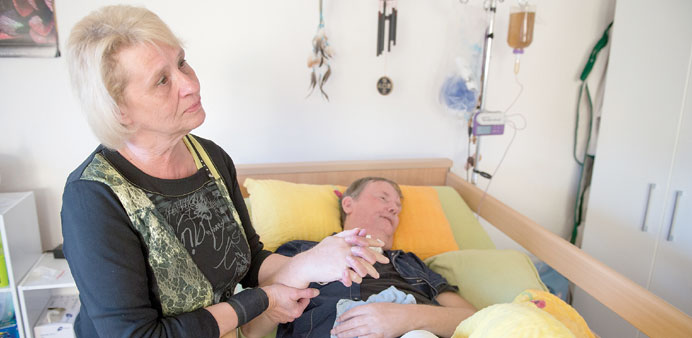Persistent vegetative state patients may open their eyes, make sounds, respond to reflexes or move, but they are unaware of their surroundings, writes Jonas Schoell
The evening that changed everything was 14 years ago. Diana and Ruediger Schmidt were watching a movie in their living room when Ruediger’s heart suddenly stopped — probably due to a severe allergic reaction known as anaphylactic shock, but Diana still isn’t certain.
Ruediger is now 65. Though doctors saved his life, he fell into a persistent vegetative state (PVS), a so-called “waking coma.” PVS patients may open their eyes, make sounds, respond to reflexes or move, but they are unaware of their surroundings.
Ruediger will never be able to speak with his wife again.
In 2012 he was moved into a former forester’s lodge in the south-western German town of Moessingen as the first of now nine PVS patients in an alternative living arrangement which is somewhere between a nursing home and in-home care.
It’s managed by the disabled residents’ families, who established it because they were dissatisfied with nursing-home care or overwhelmed by the task of looking after their loved ones themselves.
Along with care from their relatives, the resident PVS patients receive round-the-clock care from professionals employed by the care-giving arm of the German Red Cross.
The unusual living arrangement seems to be working.
“We don’t need to advertise our home-demand is enormous,” said Annette Saur, co-founder and chairwoman of Ceres, an abbreviation of “cerebral rescue.” The Moessingen-based association for the assistance of the brain-damaged is behind the project.
According to the German Waking Coma Society, more and more such homes are cropping up across Germany.
“We estimate there are already two or three per district, which makes about 1,000 in Germany in all,” said Armin Nentwig, the society’s chairman.
“The goal in the first years (after a traumatic brain injury) is always to get the patients to emerge from unconsciousness,” said Saur, who added they deserved decent living conditions even if they never did regain consciousness. At the Ceres home in Moessingen, the aim is to make the residents feel safe, secure and at home.
Most of all, Saur said, the relatives and care workers want to devote more time to the patients than is typically the case in nursing homes.
“You’ve got to build trust,” she said. “Then PVS patients open up and become ‘decipherable.’”
Rapid breathing or spitting could be a sign of discontent, for example, or facial crinkling a sign of pleasure — as with Ruediger, whose lips, ever so briefly, creased into a smile.
“What a wonderful moment!” said Diana, who was sitting at her husband’s bedside, stroking his hands and speaking softly to him. She kissed him on the forehead.
Ruediger’s smile quickly faded. His eyes remained open but his gaze was blank.
PVS patients often get too little attention in nursing homes, remarked Diana, who described “assembly-line” care there, short staffing and a lack of time. Ruediger’s eight years in a nursing home traumatised him, she said.
“I was shocked whenever I walked through the door,” she recalled.
Each patient in the Moessingen home has a private room. Over Ruediger’s bed hangs a dream catcher, and family photographs adorn the walls. The rooms of the home are bathed in light, its hardwood floors are of oak, ash and beech. There’s a living room, a kitchen, communal bathrooms and a garden.
The communal living arrangement is meant to ease the burden on everyone, Saur said. Diana nodded in agreement.
“In-home care destroys families,” she said, speaking from personal experience. “At some point you give up having a life of your own.”
Diana said coping with Ruediger’s condition had been especially difficult for the couple’s two daughters, and that supposed friends had turned their backs on the family.
The Ministry of Social Affairs in the south-western German state of Baden-Wuerttemberg was non-committal on the best form of care for PVS patients.
“No living arrangement is intrinsically better than the others,” said ministry spokesman Helmut Zorell. “A successful communal arrangement essentially depends on how the relatives and unpaid volunteers are integrated into daily activities.”
If they’re not well integrated, he said, then inpatient care, with its reliability and certified standards, is preferable.
As for Diana, it’s clear that the home in Moessingen is best for her husband. And not only for him: She said she now could relax in good conscience now and then and drive past the home knowing that Ruediger was in good hands. — DPA

